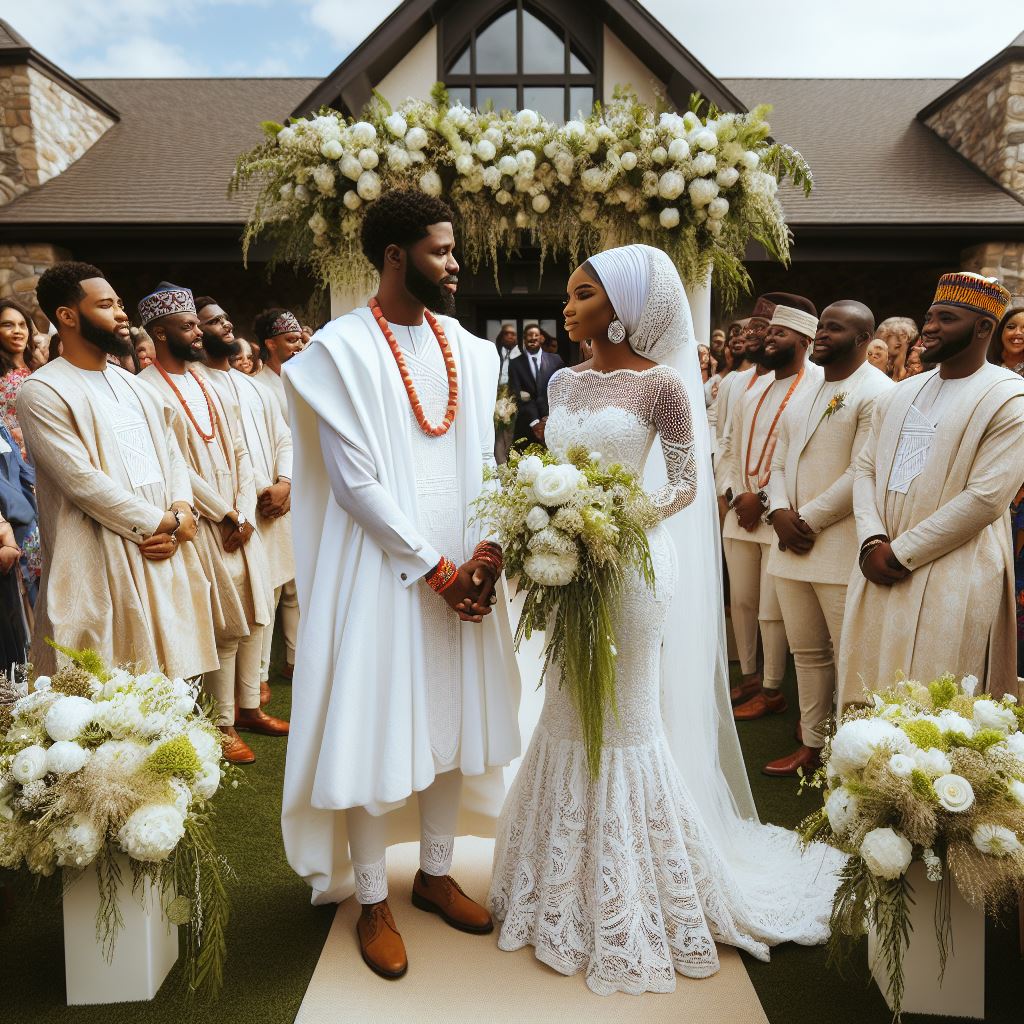Introduction
The importance of choosing wedding venues and understanding wedding laws across US states
Planning a wedding involves many important decisions, and one of the most crucial is choosing the right venue. Additionally, understanding the wedding laws across different US states is essential.
The diversity of options available can be overwhelming
The options for wedding venues are incredibly diverse, ranging from beautiful outdoor locations to elegant ballrooms. With such a wide array of choices, it can be overwhelming for couples to make a decision.
The purpose of the blog post and the information it will provide
- In this blog post, we aim to provide valuable information about choosing wedding venues and understanding wedding laws across US states.
- By doing so, we hope to alleviate some of the stress and confusion that couples may experience during the planning process.
- Here, you will find a comprehensive guide that outlines the essential factors to consider when selecting a venue. We will also delve into the legal requirements and regulations that vary from state to state.
- Whether you dream of an intimate beach wedding in California or a traditional ceremony in New York City, this blog post is your go-to resource.
- We will help you navigate through the plethora of options and ensure that you are well-informed throughout the planning journey.
So, let’s dive in and explore the exciting world of wedding venues and laws across US states, making your special day even more memorable and stress-free.
Choosing the Right Wedding Venue
A wedding venue plays a crucial role in bringing the couple’s vision to life and staying within their budget. Thinking and planning ahead is essential to make this decision a success.
Here are some tips to consider when choosing a wedding venue.
The Importance of Selecting a Wedding Venue that Aligns with the Couple’s Vision and Budget
- Choosing a wedding venue that aligns with the couple’s vision and budget is crucial to create a memorable and stress-free wedding experience.
- The venue sets the tone for the entire event and influences other planning aspects. It’s important to have a clear idea of the wedding style, ambiance, and guest count before beginning the venue search.
- This helps to narrow down options and prevents wasting time and energy on unsuitable venues.
Tips on Factors to Consider When Choosing a Venue such as Capacity, Style, and Location
- The capacity of the venue is one of the first things to consider. It should comfortably accommodate the number of guests expected.
- The style and ambiance of the venue should also match the overall wedding theme. Couples should consider whether they prefer a rustic barn, elegant ballroom, beachfront, or garden wedding.
- Location is another crucial factor, considering the convenience for both the couple and guests. Easy accessibility, nearby accommodations, and transportation options are worth considering.
Some Popular Wedding Venue Options across US States, with Specific Examples and Unique Features
Various states in the US offer stunning wedding venue options, each with its own unique features. Here are some popular choices:
- Sonoma Valley, California – Known for its breathtaking vineyards and wineries, Sonoma Valley provides a romantic backdrop for nature-loving couples.
The rolling hills, lush landscapes, and exquisite wine tasting experiences make it a popular choice for weddings. - Savannah, Georgia – This charming southern city offers historic mansions and elegant gardens, perfect for couples seeking a classic and timeless wedding.
The oak-lined streets, cobblestone squares, and warm hospitality make Savannah a dreamy destination. - Aspen, Colorado – If couples envision a winter wonderland wedding, Aspen is the ideal choice. With its snowy mountains, cozy lodges, and ski resorts, Aspen offers a romantic and adventurous setting.
- Maui, Hawaii – For couples dreaming of a beach wedding, Maui is a picturesque paradise. With its stunning beaches, breathtaking sunsets, and tropical vibes, Maui offers various venue options ranging from beachfront resorts to private estates.
Choosing a wedding venue is a significant decision that requires thoughtful consideration. Couples should explore different options, visit venues in person, and envision themselves celebrating their special day in each space.
By choosing a venue that aligns with their vision, budget, and overall aesthetic, the couple can create a truly magical and memorable wedding experience.
Read: Name Change After Marriage: USA Norms for Nigerian Couples
Understanding Wedding Laws Across US States
The Significance of Understanding Legal Requirements and Restrictions
- Understanding legal requirements and restrictions is crucial for a successful wedding planning process.
- Each state has its own unique laws and regulations that couples must comply with.
- Not being aware of these legal aspects can lead to complications and even invalidate the marriage.
- Couples need to ensure they meet the legal obligations to have a legally recognized wedding.
- Understanding the laws also helps couples make informed decisions about their wedding details.
Common Legal Aspects to Consider When Planning a Wedding
- Marriage license: Couples need to apply for a marriage license, usually from the county clerk’s office.
- Waiting periods: Some states have mandatory waiting periods between obtaining the license and getting married.
- Officiant qualifications: Certain states have specific requirements for who can officiate a wedding ceremony.
- Age restrictions: Each state has laws regarding the minimum age for marriage and parental consent for minors.
- Blood tests: While rare, a few states still require couples to take blood tests before getting married.
- Divorce and marriage history: Previous marriages, divorces, or annulments may affect the validity of a new marriage.
Variations in Marriage License Requirements, Waiting Periods, and Officiant Qualifications
- Marriage license requirements can vary, including documents needed, fees, and waiting periods.
- Waiting periods can range from no waiting time to a few days, weeks, or even months.
- Officiant qualifications differ, with some states allowing anyone to officiate while others require ordination.
- Certain states also recognize online ordination, making it easier for friends or family members to officiate.
Breakdown of Wedding Laws in Different States
1. California
- California is known for its lenient marriage license requirements, only needing valid identification.
- There is no waiting period, and anyone over 18 can officiate a wedding.
- However, same-sex marriages were only legalized in California in 2008.
2. New York
- New York requires couples to obtain a marriage license at least 24 hours before the ceremony.
- Officiants must be registered with the city or town clerk where the wedding will take place.
- Same-sex marriage has been legal in New York since 2011.
3. Nevada
- Nevada is famous for its quick and hassle-free marriage process.
- There is no waiting period, and no blood tests or witnesses are required.
- Anyone over 18 can officiate, including friends or family members.
4. Texas
- Texas requires a valid marriage license obtained from the county clerk’s office.
- There is a 72-hour waiting period, except for active military personnel.
- Officiants must be ordained or licensed by a religious organization.
5. Massachusetts
- Massachusetts requires couples to apply for a marriage license at least three days in advance.
- Officiants must be registered to solemnize marriages with the state government.
- Same-sex marriage has been legal in Massachusetts since 2004.
It’s important for couples to research and understand the specific laws and regulations in their chosen state.
Being well-informed ensures a smooth and legally recognized wedding experience.
Read: Tying the Knot: Differences Between US and Nigerian Ceremonies

Tips for Navigating Wedding Laws
Practical advice on how to research and navigate the specific wedding laws of the chosen state
Planning a wedding involves more than just choosing a venue and sending out invitations. Couples must also navigate wedding laws that vary from state to state.
To ensure a smooth and legal wedding, here are some tips:
- Research the Laws: Start by researching the specific wedding laws of the chosen state. Each state has its own requirements for obtaining a marriage license, including age restrictions, waiting periods, and required documentation. Familiarize yourself with these laws before proceeding.
- Use Official Government Websites: When researching wedding laws, it is crucial to rely on accurate and up-to-date information.
Avoid unreliable sources and instead utilize official government websites, such as the state’s Department of Health or Marriage Bureau. - Consult Local Wedding Planners: Local wedding planners are experienced professionals who are knowledgeable about the legalities of weddings in their area.
Seek their assistance and ask for guidance in understanding and complying with the wedding laws of the chosen state. - Consider Hiring an Attorney: In some cases, couples may require legal advice to navigate complex wedding laws.
Attorneys specializing in family law or wedding-related matters can provide expert guidance and ensure compliance with all legal requirements. - Attend Local Marriage Workshops: Some states offer marriage workshops or premarital counseling programs that provide information about wedding laws and other legal aspects of marriage.
Consider attending these workshops to gain valuable insights and resources. - Ask for Recommendations: Reach out to recently married friends or family members who have tied the knot in the same state.
They can provide firsthand information about their wedding experience and offer tips on dealing with the legal requirements.
Utilizing online resources and official government websites for accurate and up-to-date information
In the digital age, information is just a click away. Make use of online resources and official government websites to stay updated on wedding laws and regulations:
- State Government Websites: Official government websites provide accurate and reliable information about wedding laws, including marriage license requirements, application procedures, and any necessary documentation.
- Online Wedding Planning Portals: Many wedding planning websites offer comprehensive guides and resources specific to each state. These platforms provide valuable information about legal requirements, making it easier for couples to understand and comply with the laws.
- Wedding Forums and Communities: Engage with online wedding forums and communities where couples share their experiences and offer advice. These platforms often have knowledgeable members who can provide insights into the legalities of weddings in different states.
- Legal Aid Websites: Legal aid websites provide free or low-cost legal resources, including information on wedding laws and marriage license requirements. Utilize these websites to gain a better understanding of the legal aspects of getting married.
Couples to consult with local wedding planners, attorneys, or wedding professionals who are knowledgeable about the legalities
When it comes to understanding and complying with wedding laws, seeking expert advice is always beneficial. Consider these options:
- Local Wedding Planners: Wedding planners have extensive knowledge about the legal requirements in their specific area. Consult with them to ensure all legal aspects of the wedding are properly addressed and adhered to.
- Attorneys specializing in Family Law: If the wedding involves complex legal matters or if couples want added reassurance, consulting with attorneys specializing in family law can provide expert guidance on navigating wedding laws.
- Wedding Professionals: Other wedding professionals, such as officiants or photographers, often have experience working within the constraints of specific wedding laws. Discuss any concerns or questions with them to ensure compliance.
Navigating wedding laws can be overwhelming, but with the right resources and guidance, couples can ensure a smooth and legally compliant wedding.
By researching the specific laws, utilizing online resources, and consulting with experienced professionals, couples can confidently walk down the aisle knowing their wedding is both memorable and legally binding.
Read: The Role of Witnesses in US Marriages: What Nigerians Should Know
Delve into the Subject: Role of the Registrar in Nigerian Statutory Marriages: An Overview
Planning for Legalities
Allocating Time for Fulfilling Legal Requirements
Allocating sufficient time for fulfilling legal requirements is crucial during the wedding planning process. It ensures a smooth and legally recognized marriage.
Checklist of Essential Tasks
- Obtain a marriage license from the local county clerk’s office.
- Research and understand the specific requirements for obtaining a marriage certificate in your state.
- Arrange for any necessary blood tests or medical certificates.
- Gather all required documents, such as birth certificates, identification cards, and divorce decrees if applicable.
- Schedule appointments for premarital counseling or relationship education programs, if required by your state.
- Ensure both parties are of legal age and meet the residency requirements, if any.
- Attend any mandatory waiting periods, which can vary by state.
- Make a note of deadlines for submitting paperwork and fulfilling legal obligations.
- Consult with an attorney if considering a prenuptial agreement.
Additional Considerations Based on State Differences
It is important to be aware of the legal differences across US states when planning a wedding. Here are some additional considerations:
- Prenuptial Agreements: Some states have specific laws regarding the validity and enforceability of prenuptial agreements. Consult with an attorney for guidance.
- Name Change Procedures: Each state has different procedures for changing your name after marriage. Familiarize yourself with these processes to ensure a smooth transition.
- Common Law Marriage: A few states recognize common law marriages. If eligible, understand the requirements and implications of such marriages.
- Same-Sex Marriage: While same-sex marriage is legal nationwide, ensure that your chosen state recognizes and supports your right to marry.
- Marriage Officiants: Some states restrict who can perform wedding ceremonies. Determine whether your chosen officiant meets the legal requirements.
- Covenant Marriage: A few states offer the option of covenant marriage, which imposes additional requirements and restrictions. Consider this if applicable.
- Marriage Dissolution: Familiarize yourself with the divorce laws in your state, including residency requirements, division of assets, and child custody provisions.
- Property Rights: Understand the property rights and matrimonial laws specific to your state to ensure a fair distribution of assets in case of separation.
By taking these legalities into account and proactively addressing them, you can ensure a legally binding and hassle-free wedding experience.
Allocating time for fulfilling legal requirements, following a checklist, and understanding state-specific considerations will contribute to a successful and legally recognized marriage.
Read: The Cost of Getting a Marriage Certificate in the USA
Conclusion
Recap the key points discussed regarding wedding venues and laws across US states
Overall, it is important to recap the key points discussed regarding wedding venues and laws across US states.
Encourage couples to take time to research and plan ahead to ensure a smooth and legally sound wedding experience
Couples are encouraged to take the time to research and plan ahead to ensure a smooth and legally sound wedding experience.
It is important to understand the unique requirements of the chosen state to avoid any legal complications or setbacks.
It is crucial to reiterate the importance of understanding the unique requirements of the chosen state to avoid any legal complications or setbacks.




